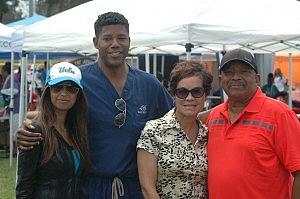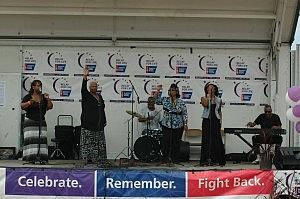The stigma of colonoscopies and African-American risk of colon cancer (Part 1)
Colorectal cancer is preventable. But the invasive test that’s required for early detection often scares people. Researchers say a much higher percentage of African-Americans, compared with other groups, don’t sign up for the procedure. The consequences can be fatal.
Avishay Artsy reported this story, the first in a three-part series, for KCRW as a 2015 California Health Journalism Fellow at the University of Southern California’s Annenberg School of Journalism.
Other stories in the series include:
Why African Americans are at a greater risk of colon cancer (Part 2)
How to reduce the disparities in colon cancer outcomes (Part 3)
African Americans face higher colon cancer risk, less likely to be screened (Part 4)

Dr. Zuri Murrell addresses the audience at the “Relay for Life” event in Baldwin Hills on June 27, 2015. Photo by Avishay Artsy.
Nearly 50,000 Americans are expected to die from colorectal cancer this year. It’s one of the leading causes of cancer-related deaths in the U.S.
African-Americans are more likely than any other group to develop colorectal cancer and to die from it.
On a Saturday morning in Baldwin Hills, at a “Relay for Life” event for cancer survivors. Ramona Stephens called to the stage a tall, African-American man, wearing a lab coat.
“Dr. Zuri Murrell, y’all start clapping for him right now. Put his white coat on before he came up here, we know you’re a doctor,” Stephens said.

Murrell thanked the crowd and acknowledged the cancer survivors. Then he asked the audience to join him in a little call and response.
“I want everybody who’s here, who can hear me, I want you guys to say colon and rectal cancer,” Murrell said, as the crowd repeated the phrase. “What I always tell people is I really believe that that word rectum is why there’s still so many deaths. I always say that you should never die from fear and you should never die from embarrassment. Colorectal cancer is the number two cancer killer in America. Yet it is the only cancer that is truly preventable.”
This is the point Dr. Murrell keeps coming back to. Colorectal cancer is preventable. But the invasive test that’s required for early detection scares people. A colonoscopy uses a thin, flexible tube with a camera at the end. It can detect polyps – growths on the lining of a colon or rectum – before they become cancerous. Researchers say a much higher percentage of African-Americans, compared with other groups, don’t sign up for the procedure.
“And if you’re one of these people that you know you need to have it but you’re scared, remember that you should have it maybe not for you, but you need to have it for your family, you gotta have it for all the people that are actually depending on you,” Murrell said.
I wandered through the crowd, asking if anyone could introduce me to a colon cancer survivor. One woman, Erin Stennis, gasped when I asked her. Her husband, Michael, died of colon cancer at the age of 45. She told me that after he discovered blood in his stool, a gastroenterologist told him to get a colonoscopy.
“My husband was an athlete, and a man’s man, and when he found out what a colonoscopy was, what the procedure entailed, he said no one was going to do that to him, and so he literally sucked up the pain for about six years, and it got to the point where I found him hunched over in a closet in our home,” Stennis said.

Stennis was a successful businessman and former football player. After six years of dealing with the pain, his wife and some close friends forced him to get the procedure.
“And they couldn’t even get the scope up, he was full of so much cancer,” Stennis said.
Michael Stennis was diagnosed with stage four colon cancer. The couple began talking to everyone they could, going to churches and other groups, to try to raise awareness of colon cancer among African Americans.
“I think it’s a message that we need to get out, especially to the African-American community and to make them aware of this disease, that by going and having a colonoscopy you lessen the chances of being diagnosed with this. It’s getting over the stigma attached to colonoscopy and what the procedure entails,” Stennis said.
It was only after the diagnosis that Stennis found he had an extensive family history of cancer. Almost two years to the day after he was diagnosed with colon cancer, Michael Stennis died, leaving behind his wife and two young children. That was in October of 2003.
At the “Relay for Life” event, Erin Stennis introduced me to a colon cancer survivor named Michael Webb. He’s been cancer-free for 10 years. But when he tells other African-American men to get colonoscopies, he says they are reluctant.
“You get all kinds of answers. Some of the answers are, are you kidding, I’m not going to have a scope stuck up, you know, unh unh, no. I just feel uncomfortable with that. And they’re unaware just as I was unaware. When they get the pains, they don’t know that it could be the start of something bigger than stomach ache or side ache or something like that. And so they nonchalantly accept the information. Until it truly happens to them, then they get a wake up call, like I did,” Webb said.
Colon cancer, says Michael Webb, is a silent killer. People don’t want to talk about it because of the stigma associated with that part of the body. Research shows African-Americans have lower rates of screening for colon cancer than white Americans, even if they have a family history of cancer, and even if they have the same access to health insurance. Tomorrow, we’ll look at genetics, diet and other health issues that factor into why African-Americans are more likely to get colon cancer than other groups.
This story was originally broadcast on KCRW.

